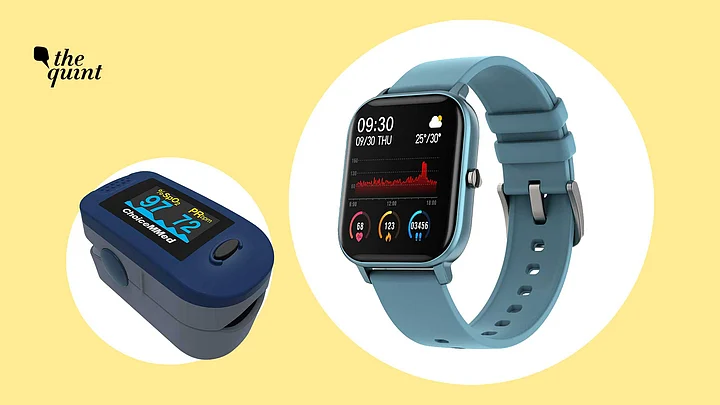Oximeters used to check the oxygen saturation levels are flying off the shelves in medical shops amid the sweeping second wave of the coronavirus pandemic.
The spike in demand for pulse oximeters has forced people across the country to look out for other options such as smart wearable watches with an inbuilt SpO2 scanner.
Prashant Baldota, 42, a resident of Pune couldn't buy an oximeter citing short supply of the product. "I visited three medical stores in my region, but not even one had an oximeter. I even tried on Amazon and Flipkart but the product was out of stock."
After researching online, Baldota bought a smart watch which he says is fully capable of monitoring blood oxygen supply. "I bought two devices –one for my wife and one for myself. The device monitors my body temperature as well and I can also check my pulse."
'Not Much Price Difference'
Smartwatches and fitness bands that can measure blood oxygen level SPO2 are witnessing renewed consumer interest due to the similar pricing of both products.
Akshay Raval, 22, a resident of Mumbai told The Quint that there is not much price difference between an oximeter and an SpO2. "I was going to buy an oximeter, but a friend of mine suggested I buy a smart watch with SpO2 support instead. So, I checked online and a good oximeter falls in the range of Rs 1400-3000, depending on the quality of the product."
Akshay asserted that at the same rate he could buy a smartwatch. "These smart bands can be used even after the pandemic is over, whereas there is not much need for an oximeter after the pandemic ends."
Oximeters in Short Supply
The Quint spoke to medical store owners to understand if there is a short supply of oximeters. Mayur Ranade, owner of Samruddhi Medical store in Pune, said that the demand has drastically increased during the second wave of coronavirus. "I had ordered 50 pulse oximeters last week, but all the devices are sold now," he said.
Another medical store owner, Hemant Chaudhary of Laxmi Medical said that the demand is sky high. “After the COVID-19 outbreak last year, the demand for pulse oximeters have shot up. We have ordered for another batch of oximeters, which is expected to arrive on Thursday."
Meanwhile, there are several smartwatches and fitness bands in India that come with support for blood oxygen monitor and other health features such as heart rate monitor, temperature monitor, and the likes.
But.. Are These Smart Watches Reliable?
Explaining why a good oximeter is considered more reliable when it comes to measurement of SpO2 compared to a smartwatch or smart band, Dr Rajesh Deshpandey told The Quint, "The major difference is of technology and in this case oximeters are specially designed to measure blood oxygen level. On the other hand, these smart bands use obsolescent technology."
Deshpandey highlighted that these smartwatches can prove to be a good alternative to pulse oximeter but not for people with comorbidities or other serious existing health conditions.
Biomedical Engineer Pranav Kaistha believes that smart watches give you a fair idea about blood oxygen levels but are not as accurate as actual pulse oximeters.
"Even if you look at disclaimers by top smart watch manufacturers like Apple and Huawei, you will find them claiming that the SpO2 measurement by their watch is for reference purpose only and not intended for medical use"Pranav Kaistha, Founder and CEO Oxygen Times
